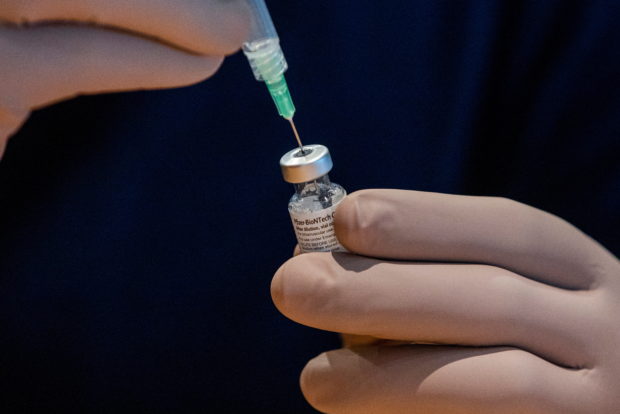
FILE PHOTO: A healthcare worker prepares a dose of the Pfizer/BioNTech coronavirus disease (COVID-19) vaccine, which was authorized by Canada to be used for children aged 12 to 15, at Woodbine Racetrack pop-up vaccine clinic in Toronto, Ontario, Canada May 5, 2021. REUTERS/Carlos Osorio
The following is a roundup of some of the latest scientific studies on the new coronavirus SARS-CoV-2 and efforts to find treatments and vaccines for COVID-19, the illness caused by the virus.
Delaying second Pfizer/BioNTech dose boosts antibodies in elderly
Delaying the second dose of the Pfizer/BioNTech COVID-19 vaccine beyond the originally recommended three-week gap used by the companies in clinical trials appears to induce a stronger antibody response in the elderly, UK researchers found.
Shortly after the vaccine became available, UK health officials advised that the second dose should be given 12 weeks after the first to allow more people to get protected by a first dose early on.
In a new paper seen by Reuters and expected to appear on medRxiv on Friday ahead of peer review, researchers found that among 175 people ages 80 to 99, those who got their second dose at 12 weeks had antibody responses that were 3.5 times higher than those who got it after three weeks.
Antibodies are only one part of the immune system, and vaccines also generate T cells that fight infections. The peak T cell responses were higher in the group with a three-week interval between doses, and the authors cautioned against drawing conclusions on how protected individuals were based on which dosing schedule they received.
Impact of obesity on COVID-19 risks may be greater in men
The known increased risk of severe COVID-19 and death linked to obesity may be even more pronounced for men than women, new data suggest.
Researchers studied 3,530 hospitalized COVID-19 patients with an average age of 65, including 1,469 who were obese.
In men, moderate obesity was associated with a significantly higher risk of developing severe disease, needing mechanical breathing assistance, and dying from COVID-19. The threshold for moderate obesity is a body mass index (BMI) of 35. In a 5-foot, five-inch tall (1.65 m) adult, that would correspond to a weight of 210 pounds (95 kg).
In women, however, only a BMI of 40 or higher, indicating severe obesity, was linked with the increased risks. In a report published in the European Journal of Clinical Microbiology & Infectious Diseases, the researchers note that while obesity is known to be linked with body-wide inflammation, patients’ levels of inflammatory proteins did not appear to explain the association between obesity and severe illness.
For now, they conclude, “particular attention should be paid” to protecting patients with obesity from the coronavirus, “with priority to vaccination access, remote work, telemedicine, and other measures given the higher risk of adverse outcomes once they are diagnosed with COVID-19.”